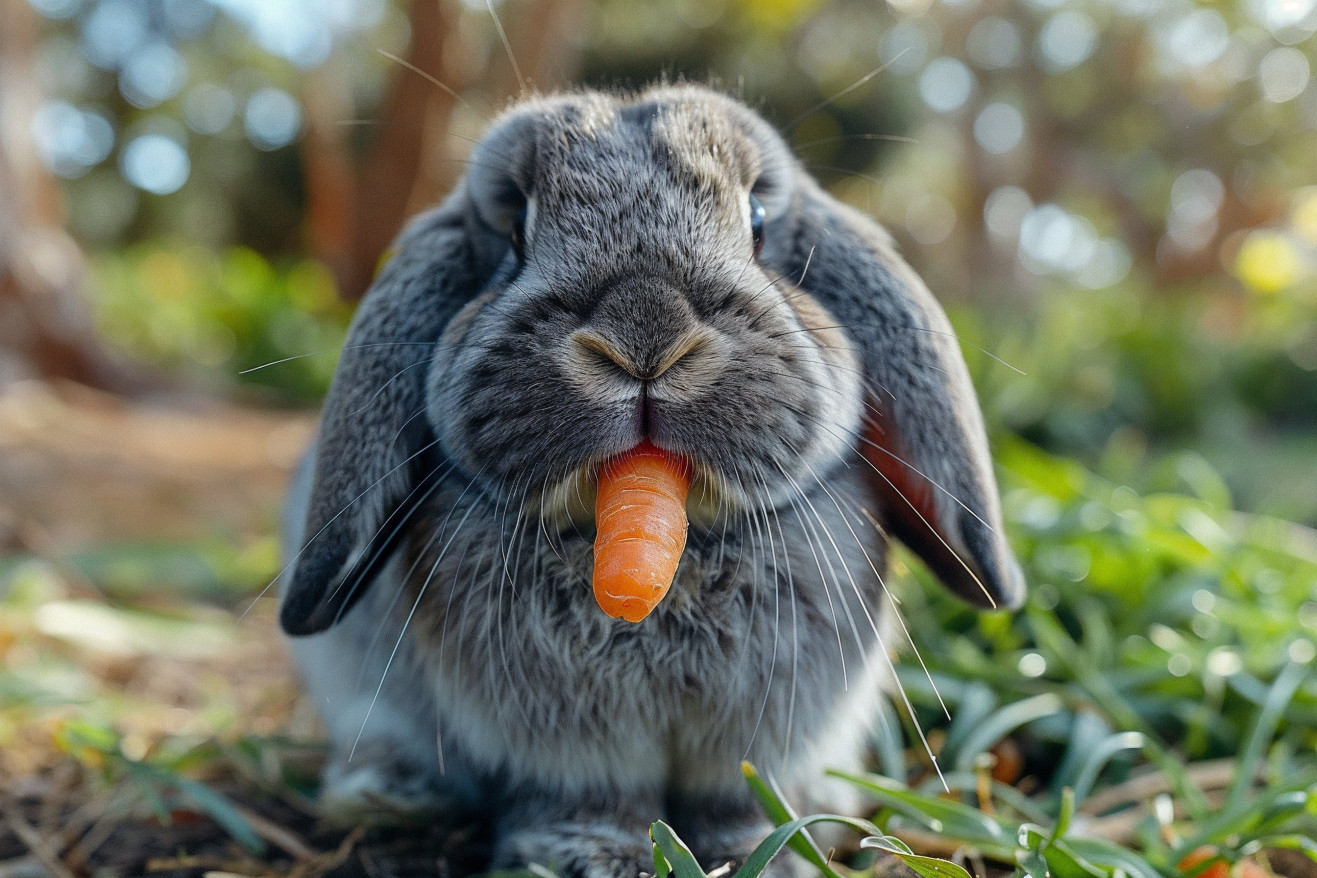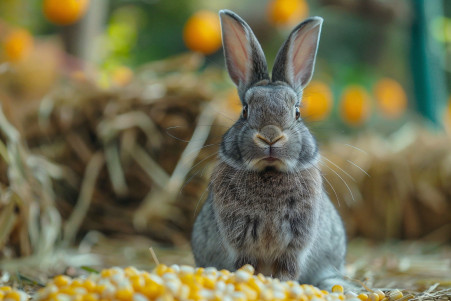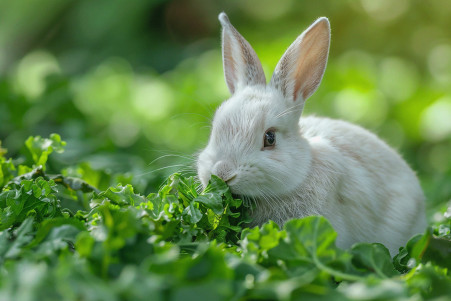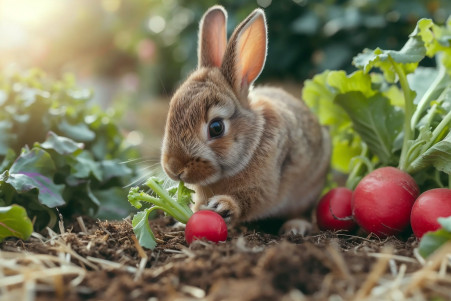Can Rabbits Eat Carrots? The Science Behind Common Beliefs
7 March 2024 • Updated 7 March 2024

The association between rabbits and carrots goes back generations, but is it based in fact or fiction? While rabbits can eat carrots, they are high in sugar and should only be fed to rabbits as an occasional treat. A healthy rabbit diet should mainly consist of hay, leafy greens, and fiber-rich pellets, with carrots as a supplement.
In order to better understand rabbit diets and the place of carrots in them, we’ll take a look at a variety of studies in the fields of veterinary science, animal nutrition, and agriculture. Together, these studies will help us better understand rabbit nutritional needs, the impact of different foods on rabbit health, and the history of carrot farming. This will give us a well-rounded look at what a healthy rabbit diet looks like.
Can rabbits eat carrots?
Knowing What a Rabbit’s Diet Should Be Based On
A rabbit’s diet should be based on hay, grass, and leafy greens, all of which are essential to a rabbit’s health. Not only does hay act as both bedding and a food source for rabbits, but it also helps rabbits maintain their dental health by keeping their teeth, which grow continuously, worn down and supports their digestive health because it’s high in fiber.
The RSPCA says that hay should be made available to rabbits at all times to encourage natural foraging behaviors.
In addition to hay, rabbit owners should offer commercial rabbit pellets, but only in limited amounts to help ensure that rabbits get the nutrients they need, avoid overeating, and eat enough hay or grass. The Merck Veterinary Manual says that pellets should only make up a small part of a rabbit’s diet to help prevent obesity and maintain gastrointestinal health.
Rabbit owners should also make sure that their rabbits have access to fresh, clean water at all times since rabbits usually drink about 120 mL/kg/day, according to the Merck Veterinary Manual. While rabbit owners can give their pets treats, like carrots, they should do so in moderation because of their high sugar content, according to the RSPCA and the Bunny Lady.
In general, treats should only make up a small part of a rabbit’s diet to help ensure that it supports their health and doesn’t lead to nutritional imbalances.
Feeding Bunnies Carrots: How to Balance Nutrition and Health
Carrots are often thought of as a nutritious option for feeding bunnies because they are packed with important vitamins and minerals. At the same time, carrots are also high in sugar, and while some sugar can be good for rabbits, too much can lead to health problems.
As noted in Animals, the addition of dietary supplementation and whole carrots to a rabbit’s diet had no impact on meat yield, which means that it is possible to include carrots in a rabbit’s diet in moderation.
Feeding rabbits too many carrots can lead to obesity and other digestive issues because their digestive system is built to process high-fiber, low-sugar foods like hay and leafy greens. To avoid dental issues, it’s important to limit the amount of sugary treats rabbits eat, as noted by ScienceDirect, which underscores the importance of fiber in terms of gut motility and health.
When feeding rabbits carrots as a treat, it’s important to do so in a way that prioritizes the rabbit’s health. The study from Animals on the impact of oat hay and carrot supplementation shows that when rabbits are fed carrots in a way that’s balanced, it helps to support their health and productivity.
This means that rabbits can enjoy the occasional carrot treat, but their basic nutritional needs are being met, which supports their overall health and well-being.
In addition to nutritional considerations, it’s important to think about how cultural beliefs, like the myth of rabbits and carrots, impact how we feed rabbits.
Debunking the Carrot Myth: Scientific Insights into Rabbit Nutrition
The idea that rabbits eat a lot of carrots is one of the most common misconceptions about rabbit diets, and it has more to do with the way rabbits have been depicted in popular culture than with their actual eating habits.
The image of Bugs Bunny eating a carrot, which was originally a parody of a scene from the 1934 movie “It Happened One Night” starring Clark Gable, is to blame.
According to Medium, Bugs Bunny’s casual consumption of the vegetable was a direct imitation of Gable’s behavior in the movie, and it inadvertently cemented the idea that rabbits eat carrots in the public’s mind.
The influence of popular culture on people’s ideas about rabbits’ diets is a perfect example of how the media can shape public perception. Unfortunately, the cute and endearing myth that rabbits eat a lot of carrots can have negative consequences when it leads pet owners to feed their rabbits too many of them and not enough of the foods they actually need.
Pawsitively Pets warns that overfeeding rabbits carrots can lead to dental issues, digestive problems, and nutritional imbalances.
This is why it’s so important for people to have accurate information about what rabbits eat. The RSPCA says that because carrots are high in sugar, they should be fed to rabbits only occasionally, not regularly. This myth and others like it need to be dispelled through education so that pet rabbits can be fed a healthy diet that includes plenty of hay, grass, and leafy greens.
Carrot Cultivars: A Rainbow of Nutritional Differences for Rabbits
Carrots, which are a type of root vegetable in the Umbelliferae family, are grown by farmers to meet the needs of the fresh market and processing industries. According to the UGA Cooperative Extension, commercial carrot production involves growing carrots in specific soil types and using certain planting techniques to ensure the best results in the field.
Carrot cultivars, which can be long and tapered or short and round, are chosen by farmers based on the market they are growing for, whether it’s fresh, culinary, or processing.
The differences in the nutritional content of carrots are also quite diverse. In a study published by PMC, purple carrots were found to have the highest levels of polyphenols, while orange and yellow carrots had the most carotenoids. The study even suggested that the health benefits of the different colored carrots varied between samples, which could mean that different colored carrots are more or less beneficial to rabbits based on their nutritional content.
When it comes to the nutritional content of carrots that are commercially grown for rabbits, the amount of fiber, as well as the vitamins and minerals, are the most important factors. A study published by ScienceDirect found that carrots like Amazonia, which have high fiber and protein levels, are more likely to be suitable for rabbits, as they are more likely to meet the rabbits’ nutritional needs for high-fiber foods.
As a result, the decision to include carrots in a rabbit’s diet should be based on the nutritional content of the specific cultivar. This is backed up by scholarly research, which recommends that carrots be included in rabbit diets but that they are balanced with high-fiber foods like hay.
With this in mind, we’ll take a deeper look at rabbit digestion and metabolism to ensure that these nutrient-dense treats are a positive addition to their diets.
Understanding Rabbit Digestion
Rabbits have a unique digestive system that has evolved to process large amounts of fibrous plant material. An article in Veterinary Clinics: Exotic Animal Practice explains that the rabbit digestive tract has evolved to allow for rapid consumption of large amounts of food, efficient separation of digestible nutrients, and rapid elimination of fibrous waste.
This is why they require a diet that includes lots of hay and leafy greens, which helps keep their teeth worn down and supports healthy digestion.
An article in PMC explains that fiber is important for stimulating gut motility, which is why it’s so important in a rabbit’s diet.
However, it also explains that when it comes to sugary foods like carrots, it’s important to remember that the rabbit digestive system is not designed to handle high levels of sugar on a regular basis. This means that if rabbits eat too many carrots, it can lead to a variety of health issues, including obesity and gastrointestinal issues.
A study in Companion Animals explains that a healthy diet is important for supporting good digestive health in rabbits. It recommends feeding rabbits a diet that includes high-quality hay and a limited amount of high-fiber pellets to support the unique needs of the rabbit gastrointestinal system. This way, rabbits can enjoy the occasional carrot without upsetting the balance that’s so important to their health.
In Conclusion: What Science Says About Rabbits and Carrots
Our investigation into a rabbit’s diet and the place of carrots in it has led to several important conclusions. The importance of hay, grass, and leafy greens in a rabbit’s diet, as noted by the RSPCA, cannot be overstated in terms of maintaining dental and digestive health. Meanwhile, the study by Karim El-Sabrout in Agriculture confirms that carrots, while they have nutritional value, are high in sugar and should be fed to rabbits sparingly.
Good pet care means providing a well-balanced diet, which is essential for a rabbit’s well-being, as explained in the in-depth review in Agriculture.
Good care also means going beyond just feeding and making sure that we’re making dietary choices that support the overall well-being of these animals. That means making sure that we’re not perpetuating myths, including those that are perpetuated by the media, about what rabbits eat. This is the only way to make sure that we’re not harming our pets by continuing to believe things that aren’t true.
In short, it’s important to make sure that we’re taking a science- and veterinary-supported approach to the care of our rabbits to make sure that we’re doing everything we can to make sure that our beloved pets are healthy and happy.


